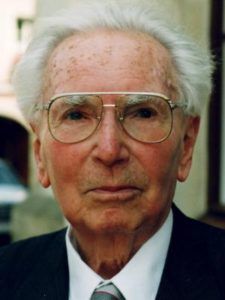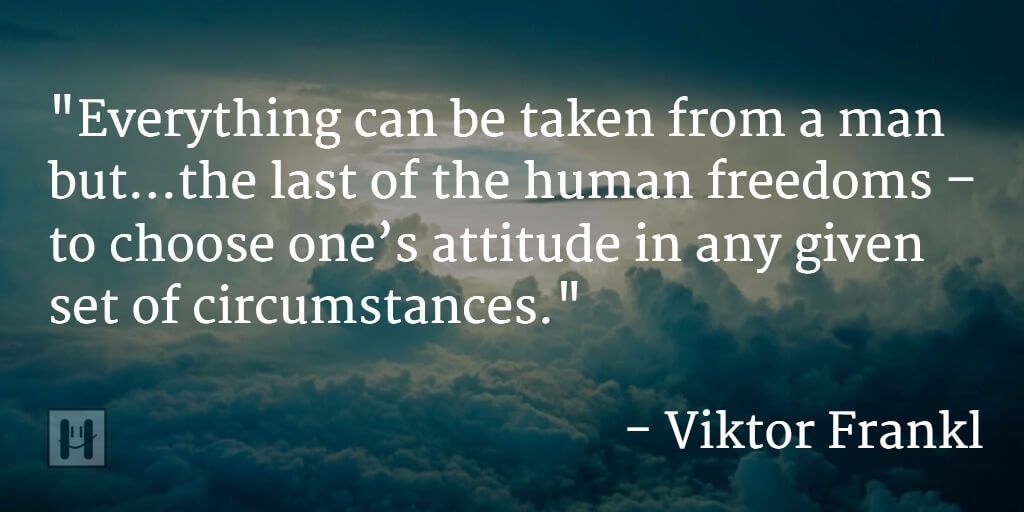Logotherapy: Viktor Frankl’s Theory of Meaning
 As the sun cascades behind the distant mountains, it creates a beautiful array of orange, peach, and pink.
As the sun cascades behind the distant mountains, it creates a beautiful array of orange, peach, and pink.
When we bask in the glory of a sunset and reflect on creation or enjoy the embrace of a loved one, it provides meaning.
As we engage with our community, participate in creative endeavors, and support a cause greater than ourselves, we experience the value of life.
What is it then that brings meaning to life? What is it that makes those hard moments, the dark nights, and endless struggles worth the fight?
The quest to answer “what is the meaning of life?” has been around since the beginning of time. To find meaning in life can be seen as the primary motivation of each person, and the concept of logotherapy is based on that proposition.
In the following article, we will take a deep dive into the creation of logotherapy, research, techniques, and worksheets.
Before you read on, we thought you might like to download our three Meaning & Valued Living Exercises for free. These creative, science-based exercises will help you learn more about your values, motivations, and goals and will give you the tools to inspire a sense of meaning in the lives of your clients, students, or employees.
This Article Contains:
Logotherapy: A Definition
Logotherapy is often referred to as the “third Viennese school of psychotherapy,” and it originated in the 1930s as a response to both Freud’s psychoanalysis and Adler’s emphasis on power within society. It is more than just “therapy.” It is a philosophy for the spiritually lost and an education for those who are confused. It offers support in the face of suffering and healing for the sick (Guttmann, 2008).
Logotherapy examines the physical, psychological, and spiritual (noological) aspects of a human being, and it can be seen through the expression of an individual’s functioning. It is often regarded as a humanistic–existential school of thought but can also be used in conjunction with contemporary therapies (McMullin, 2000).
In contrast to Freud’s “will to pleasure” and Adler’s “will to power,” logotherapy is based on the idea that we are driven by a “will to meaning” or an inner desire to find purpose and meaning in life (Amelis & Dattilio, 2013).
As humans, we often respond to situations in the first two dimensions of functioning (physical/psychological) with conditioned and automatic reactions. Examples of these reactions include negative self-talk, irrational actions, outbursts, and negative emotions.
Animals also respond in the first two dimensions. It is the third dimension of functioning that separates humans from other species. This is the unique beauty of logotherapy.
While humans can survive just like animals living within the first two dimensions (satisfying physical needs and thinking), logotherapy offers a deeper connection to the soul and an opportunity to explore that which makes us uniquely human.
The spiritual dimension is one of meaning. The basic tenets of logotherapy are that
- human life has meaning,
- human beings long to experience their own sense of life meaning, and
- humans have the potential to experience meaning under any and every circumstance (Schulenberg, 2003).
Who Was Viktor Frankl?

The Austrian psychiatrist and neurologist was born March 26, 1905, and is best known for his psychological memoir Man’s Search for Meaning (2006) and as the father of logotherapy.
He published 40 books that have been translated into 50 languages, demonstrating that love, freedom, meaning, and responsibility transcend race, culture, religion, and continents.
His most famous memoir begins by outlining a personal experience through the gruesome Auschwitz concentration camps. The three years he spent in concentration camps became more than a story of survival. Frankl embodies the modern-day definition of resilience.
He muses about the quest for meaning, the transcendental power of love, finding humor, and discovering courage in the face of difficulty. In the worst circumstances imaginable, Frankl held to the belief that the most critical freedom is an individual’s ability to choose one’s attitude.
Viktor Frankl’s Theory
Frankl viewed logotherapy as a way to enhance existing therapies by emphasizing the “meaning-dimension” or spiritual dimension of human beings. Three philosophical and psychological concepts make up Frankl’s logotherapy: freedom of will, will to meaning, and meaning of life (Batthyany, 2019).
Freedom of will asserts that humans are free to decide and can take a stance toward both internal and external conditions. Freedom in this context is defined as a space to shape one’s own life within limits of specific possibilities. It provides the client with room for autonomy in the face of somatic or psychological illness. In essence, we are free to choose our responses no matter our circumstances.
Will to meaning states that humans are free to achieve goals and purposes in life. Frustration, aggression, addiction, depression, and suicidality arise when individuals cannot realize their “will to meaning.” As humans, our primary motive is to search for meaning or purpose in our lives. We are capable of surpassing pleasure and supporting pain for a meaningful cause.
Meaning in life is based on the idea that meaning is an objective reality rather than merely an illusion or personal perception. Humans have both freedom and responsibility to bring forth their best possible selves by realizing the meaning of the moment in every situation.
Can we find meaning under all circumstances, even unavoidable suffering? We can discover meaning in life through creative clues, experiential values, and attitudinal values (Lewis, 2011).
Viktor Frankl: Logotherapy and man’s search for meaning
Research and Empirical Results
Logotherapy has significant application to every dimension of an individual (the tri-dimensional ontology). Psychologically, logotherapy uses the specific techniques of paradoxical intention and dereflection to deal with problems of anxiety, compulsive disorders, obsessions, and phobias. These will be discussed in further detail in the next section.
Physiologically, logotherapy is an effective way to cope with suffering and physical pain or loss. Spiritually, logotherapy demonstrates that life has meaning or purpose when people suffer from the “existential vacuum” that we experience as boredom, apathy, emptiness, and depression (Frankl, 2006).
1. PTSD and acute stress
One of the most effective things about logotherapy is its ability to empower individuals, allowing them to be freed from their symptoms and increase their capacity to be proactive.
Since logotherapy was founded on a preface of suffering, it is a natural therapy for treating traumatic experiences. Logotherapy is a useful treatment for individuals with acute stress disorder or post-traumatic stress disorder (PTSD).
In numerous case studies of clients with combat-related PTSD, logotherapy exercises that highlight the construct of meaning led to a significant decrease in symptoms of stress, anxiety, and depression (Schiraldi, 2000). Research on logotherapy’s effectiveness for treating PTSD has mostly been established through qualitative research and case studies.
2. Alcohol and drug treatment
There are obvious parallels between the spiritual elements of Alcoholics Anonymous and the concepts of discovering personal meaning found in logotherapy.
Frankl (2006) discussed a “mass neurotic triad” of aggression, depression, and addiction that occurs when individuals experience an existential vacuum. This vacuum leads to violations of social norms, symptoms of stress, and addiction.
The treatment for this existential vacuum is, of course, to guide the client into discovering the freedom to choose, the will to find meaning, and the responsibility of living a purposeful life (Hutzell, 1990).
Logotherapy has been effective in reducing cravings and participation in drinking among alcoholics. Additionally, logotherapy groups successfully improved the meaning of life and mental health among wives of alcoholics (Cho, 2008).
Frankl would argue that when individuals can tap into their freedom, responsibility, and life purpose, there is no longer a need or desire for mind-altering substances like alcohol or drugs.
3. Anxiety and depression
Logotherapy has successfully been used to treat depression and anxiety. One study looked specifically at depression and stress among cervical cancer patients (Soetrisno & Moewardi, 2017).
Researchers measured cortisol levels (stress hormone) and scores from the Beck Depression Inventory (BDI) among two groups of 15 patients. One group received logotherapy treatment for a total of six weeks (45-minute sessions once per week), and the control group received standard cancer treatment.
After six weeks, there was a significant decrease in BDI scores and levels of cortisol for the treatment group, while the control group had no change (Soetrisno & Moewardi, 2017). It makes sense that improving the meaning of life for cancer patients decreased their levels of stress and depression.
Logotherapy also successfully decreased measurable levels of suffering and increased the meaning of life in a group of adolescent cancer patients when compared with a matched control group (Kang et al., 2009).
Similarly, two-hour sessions of logotherapy among a group of 22 breast cancer patients significantly decreased BDI scores (Hagighi, Khodaei, and Sharifzadeh, 2012). This research demonstrated that logotherapy can be a beneficial treatment for individuals struggling through cancer or other major illnesses.
4. Group logotherapy
There is also significant research to support the use of logotherapy in group settings. Instructing both individuals and groups on the dimensions of responsibility, freedom, and values can help decrease suffering and increase various measures of psychological wellbeing.
When comparing the effectiveness of gestalt and logotherapy in a group setting of divorced women, logotherapy provided a more substantial decrease in depression, anxiety, and aggression (Yousefi, 2006).
Group logotherapy also led to increased psychological wellbeing, positive relationships, autonomy, personal growth, and mastery among mothers of children with intellectual disabilities (Faramarzi & Bavali, 2017).
3 Techniques of Logotherapy

There are similarities between the therapeutic techniques of logotherapy and both Cognitive Behavioral Therapy (CBT) and Acceptance and Commitment Therapy (ACT).
1. Dereflection
The first technique is dereflection, which is aimed at helping clients focus attention away from problems and complaints and toward something positive. It is based on the concept of self-distancing and self-transcendence.
Practically speaking, it involves asking questions like “What would your life be like without X problem?”; “If everything went perfectly in your life, what would that look like?”; and “Is there anything in your life you would die for?”
2. Paradoxical intention
Paradoxical intention is an effective technique to use with phobias, fear, and anxiety.
The basis of this technique is that humor and ridicule can be useful when fear is paralyzing. Fear is removed when action/intention focuses on what is feared the most. For example, if a person struggles with a fear of rejection, they would purposely put themselves in positions where they would be rejected or told “no.”
An apt illustration is in Harry Potter and the Prisoner of Azkaban (Rowling, 1999), where young students had to face their worst fears. To conquer their fear, they had to turn the terrifying thought into something laughable, such as a big spider on roller skates, thereby ridiculing and overcoming the paralyzing fear.
3. Socratic dialogue
Socratic dialogue is a tool in logotherapy that walks a client through a process of self-discovery in their own words.
It is different from Socratic questioning, which is often used in CBT. Socratic questioning breaks down anxious or negative thoughts, while Socratic dialogue is used to find meaning within a conversation. It allows the client to realize they already have the answers to their purpose, meaning, and freedom.
4 Activities and Worksheets
Our Positive Psychology Toolkit© contains over 400 tools, exercises and questionnaires to assist therapists, coaches and educators, to name a few. Some of these worksheets are described below.
1. Valued Living During Challenging Times
A perfect fit for Frankl’s logotherapy, the Valued Living During Challenging Times worksheet has clients reflect on a challenging circumstance and reconnect with personal values. Through this process, clients can find meaning in their suffering and become more resilient and tolerant of stress.
2. Passengers on the Bus group activity
The empirically tested metaphor “passengers on the bus” has been effectively used in ACT interventions. The Passengers on the Bus group activity uses role-play and debriefing to help clients learn to react to distressing situations in line with their values rather than choosing to avoid painful situations or act on their emotions.
3. A Value Tattoo
While logotherapy uses Socratic dialogue to find meaning, the Value Tattoo worksheet is helpful for clients who might find questions difficult or confronting. Instead of asking, “What is most important in life?” the client is encouraged to use creativity and imagine a tattoo that would be meaningful to them.
4. Find Your Purpose worksheet
This Find Your Purpose worksheet asks a series of basic questions designed to identify gifts, talents, skills, and abilities, which can ultimately reflect finding purpose in life. By finding your purpose and using your strengths in a positive way, you can create a lasting impact on the world around you and ultimately find meaning in life.
6 Famous Quotes on Life and Meaning
While finding the meaning of life seems to be at the forefront of logotherapy, Frankl argued that instead of asking this question, an individual should realize that they are the one being questioned.
He stated, “It doesn’t really matter what we expected from life, but what life expected from us” (Frankl, 1986).
Other notable quotes from Frankl’s Man’s Search for Meaning (2006) include:
When we are no longer able to change a situation, we are challenged to change ourselves.
Suffering is an ineradicable part of life, even as fate and death. Without suffering and death human life cannot be complete.
For success, like happiness, cannot be pursued; it must ensue, and it only does so as the unintended side-effect of one’s personal dedication to a cause greater than oneself or as the by-product of one’s surrender to a person other than oneself.
Related famous quotes include:
He who has a why to live for can bear with almost any how.
Nietzsche
5 Books on the Topic
- Man’s Search for Meaning (2006) is the best place to start for a brief background on Viktor Frankl and a great introduction to logotherapy. (Amazon)
- The Will to Meaning (Frankl, 2014) dives a bit deeper into the application of logotherapy (Amazon)
- Frankl’s The Doctor and the Soul: From Psychotherapy to Logotherapy (1986) is the first book published after his release from Nazi concentration camps. He discusses that the fundamental human drive is not sex (Freud’s view) or the need for approval (Adler’s perspective) but the drive to have a meaningful life. (Amazon)
- In the book Viktor Frankl’s Logotherapy, author Ann Graber (2019) focuses on the practical application of logotherapy and the effectiveness of using the spiritual dimension in existential therapy to find healing. (Amazon)
- Joseph Fabry compiles work on logotherapy in the text Finding Meaning in Life: Logotherapy (1995), which can specifically help clients with drug, alcohol, or life adjustment issues. (Amazon)
For more reading, visit our post listing the 7 Best Books to Help You Find the Meaning of Life.
Our Meaning & Valued Living Masterclass
The apparent parallels between positive psychology and Viktor Frankl’s logotherapy are endless.
While there are also notable differences, there is no denying that finding value and meaning in this journey of life leads to an array of positive outcomes.
The Meaning & Valued Living Masterclass provides an excellent background of positive psychology. It builds on the sailboat metaphor by emphasizing the types and paradox of meaning. By introducing practical exercises to find meaning and values, professionals can immediately apply techniques to address a wide range of issues.
One of the best things about positive psychology and the practicality of this masterclass is that it can improve life and wellbeing for those who are struggling, those who are suffering, and those who are looking to thrive.
If you’re looking for more science-based ways to help others discover meaning, this collection contains 17 validated meaning tools for practitioners. Use them to help others choose directions for their lives in alignment with what is truly important to them.
A Take-Home Message
Perhaps the question, “what is the meaning of life?” is not the right question for us.
Asking this question is like addressing the symptom rather than the actual problem.
If we worked on finding sources of meaning within our lives through both the good and bad experiences, then we could gain relief from existential issues and increase our resilience and wellbeing.
Once we find these potential sources of meaning and align them with our personal values and strengths, that will ultimately result in the most profound sense of joy and meaning possible.
We hope you enjoyed reading this article. Don’t forget to download our three Meaning & Valued Living Exercises for free.
- Amelis, M., & Dattilio, F. M. (2013). Enhancing cognitive behavior therapy with logotherapy: Techniques for clinical practice. Psychotherapy, 50(3), 387–391.
- Batthyany, A. (2019). What is logotherapy/existential analysis? Logotherapy and existential analysis. Viktor Frankl Institut. Retrieved from https://www.viktorfrankl.org/logotherapy.html
- Cho, S. (2008). Effects of logo-autobiography program on meaning in life and mental health in the wives of alcoholics. Journal of Asian Nursing Research, 2(2), 129–139.
- Fabry, J. B. (1995). Finding meaning in life: Logotherapy. Jason Aronson.
- Faramarzi, S., & Bavali, F. (2017). The effectiveness of group logotherapy to improve psychological wellbeing of mothers with intellectually disabled children. International Journal of Developmental Disabilities, 63(1), 45–51.
- Frankl, V. E. (1986). The doctor and the soul. Penguin Random House.
- Frankl, V. E. (2006). Man’s search for meaning. Beacon Press.
- Frankl, V. E. (2014). The will to meaning: Foundations and applications of logotherapy (Expanded ed.). Plume.
- Graber, A. V. (2019). Viktor Frankl’s logotherapy: Method of choice in ecumenical pastoral psychology (2nd ed.). Wyndham Hall Press.
- Guttmann, D. (2008). Finding meaning in life, at midlife and beyond: Wisdom and spirit from logotherapy. Praege Inc.
- Hagighi, F., Khodaei, S., & Sharifzadeh, G. R. (2012). Effect of logotherapy group counseling on depression in breast cancer patients. Modern Care Journal, 9(3), 165–172.
- Hutzell, R. R. (1990). An introduction to logotherapy. In P. A. Keller & S. R. Heyman (Eds.) Innovations in clinical practice: A source book. Professional Resource Exchange.
- Kang, K. A., Im, J. I., Kim, H. S., Kim, S. J., Song, M. K., & Songyong, S. (2009). The effect of logotherapy on the suffering, finding meaning, and spiritual wellbeing of adolescents with terminal cancer. Journal of Korean Academy of Child Health Nursing, 15(2), 136–144.
- Lewis, M. H. (2011). Defiant power: An overview of Viktor Frankl’s logotherapy and existential analysis. Retrieved June 19, 2020, from www.defiantpower.com.
- McMullin, R. E. (2000). The new handbook of cognitive therapy techniques. Norton Press.
- Rowling, J. K. (1999). Harry Potter and the Prisoner of Azkaban. Bloomsbury Publishing.
- Schulenberg, S. E. (2003). Empirical research and logotherapy. Psychological Reports, 93, 307–319.
- Schiraldi, G. R. (2000). Post traumatic stress disorder sourcebook: A guide to healing, recovery and growth. Lowell House.
- Soetrisno, S., & Moewardi. (2017). The effect of logotherapy on the expressions of cortisol, HSP70, Beck Depression Inventory (BDI), and pain scales in advanced cervical cancer patients. Health Care for Women International, 38(2), 91–99.
- Yousefi, N. (2006). Comparing the effectiveness of two counseling approaches of gestalt therapy and logotherapy on decrease of depression symptoms, anxiety and aggression among women divorce applicants. Cross-Country Congress of Family Pathology, 10(3), 658–663.
Let us know your thoughts
Read other articles by their category
- Body & Brain (49)
- Coaching & Application (57)
- Compassion (26)
- Counseling (51)
- Emotional Intelligence (24)
- Gratitude (18)
- Grief & Bereavement (21)
- Happiness & SWB (40)
- Meaning & Values (26)
- Meditation (20)
- Mindfulness (45)
- Motivation & Goals (45)
- Optimism & Mindset (34)
- Positive CBT (28)
- Positive Communication (20)
- Positive Education (47)
- Positive Emotions (32)
- Positive Leadership (18)
- Positive Parenting (3)
- Positive Psychology (33)
- Positive Workplace (37)
- Productivity (16)
- Relationships (46)
- Resilience & Coping (36)
- Self Awareness (21)
- Self Esteem (37)
- Strengths & Virtues (31)
- Stress & Burnout Prevention (34)
- Theory & Books (46)
- Therapy Exercises (37)
- Types of Therapy (64)






What our readers think
I am a trauma survivor, I didn’t even realize, what I was dealing with for such a long time was PTSD, Disassociation, Depression, Grief and Anxiety. I found a lot of relief when I discovered that I have the power, in how I perceive my past. I listen more than I speak, unless someone wants to hear what I have to say. During COVID-19 I was deemed an essential worker, I am an Auto Technician, before and during COVID-19 I was Shop Manager, I had never felt such extreme pressure knowing that the safety of the people I work with was in my hands. I drove to work everyday with no other car in sight, until I got to work. The atmosphere was so tense, I felt where I cut into it, as I walked from my car to the building I work in, I could not understand other managers attitudes and why I questioned mine. Like a wise Philosopher once said in a moment of chaos, normal behavior seems abnormal. I encouraged everyone everyday, letting them know, this wasn’t the first time in history this has happened, just like the Philosopher King Marcus Aurelius. Everyday I had something humors to say. I am used to pressure, being I grew up around violence and witnessed a kid get shot and killed by drive a by. This wasn’t my first Rodeo. What was going on in the moment, did not phase me. I would find justification in my own way, why things happen. I continued until my back eventually gave out from so much stress. I felt guilt that I had never felt before, I kept giving happiness and hope until I lost my own, and gave into the excruciating pain that bulging disc in my lower back produce. This was the life changing moment in my life. COVID-19 in full bloom and running rampant, I did not turn to traditional medicine. Instead I found a Phycologist and Therapist that helped me get past my own internal struggles, as I have come together with myself and countless hours of reading, exercising, meditation, yoga, and Philosophy. I have come to this website. After reading your article, and understanding my own struggles, I am a firm believer Logotherapy can help so many people.
Dr. Melissa Madeson,
Thank you for your well defined points about V Frankle and logotherapy. I once led a group of seniors at a convalescent center. We discussed the meaningful moments they recalled in their lives. I encouraged the participants to write their short and focused memoirs. These writings were subsequently published in a small volume. The writers and participants took part in a public reading, with family, friends, facility staff , and public in attendance. Overall, the lectures, writing, and readings were meaningful to all involved.
Finding meaning in trauma patients’ stories help them heal. Their traumas don’t define them, they’re just facts when their stories make sense.
I am a trauma therapist and I love Viktor Frankl. This article actually helped me realize that how I work with trauma patients is actually how logotherapy help patients. Thank you.